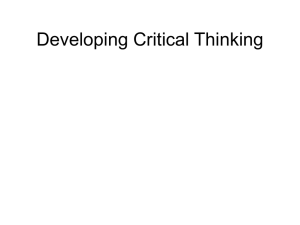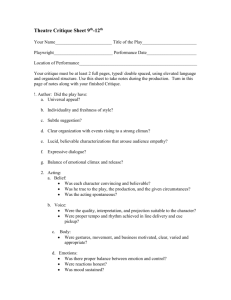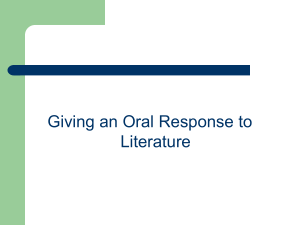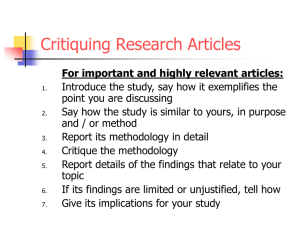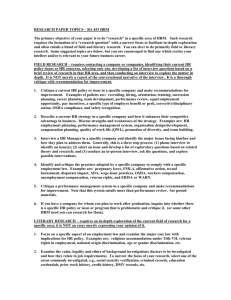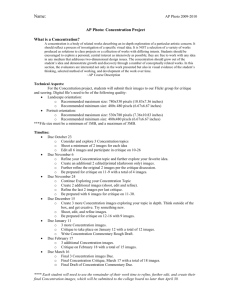Roo Critique Brief
advertisement
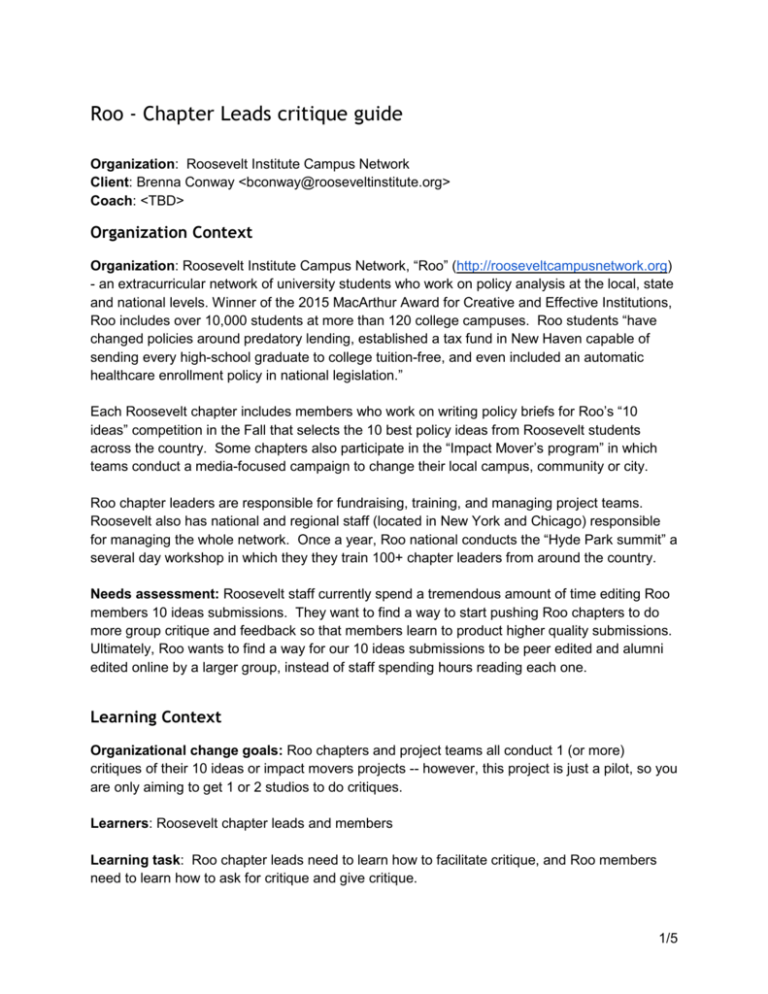
Roo - Chapter Leads critique guide Organization: Roosevelt Institute Campus Network Client: Brenna Conway <bconway@rooseveltinstitute.org> Coach: <TBD> Organization Context Organization: Roosevelt Institute Campus Network, “Roo” (http://rooseveltcampusnetwork.org) - an extracurricular network of university students who work on policy analysis at the local, state and national levels. Winner of the 2015 MacArthur Award for Creative and Effective Institutions, Roo includes over 10,000 students at more than 120 college campuses. Roo students “have changed policies around predatory lending, established a tax fund in New Haven capable of sending every high-school graduate to college tuition-free, and even included an automatic healthcare enrollment policy in national legislation.” Each Roosevelt chapter includes members who work on writing policy briefs for Roo’s “10 ideas” competition in the Fall that selects the 10 best policy ideas from Roosevelt students across the country. Some chapters also participate in the “Impact Mover’s program” in which teams conduct a media-focused campaign to change their local campus, community or city. Roo chapter leaders are responsible for fundraising, training, and managing project teams. Roosevelt also has national and regional staff (located in New York and Chicago) responsible for managing the whole network. Once a year, Roo national conducts the “Hyde Park summit” a several day workshop in which they they train 100+ chapter leaders from around the country. Needs assessment: Roosevelt staff currently spend a tremendous amount of time editing Roo members 10 ideas submissions. They want to find a way to start pushing Roo chapters to do more group critique and feedback so that members learn to product higher quality submissions. Ultimately, Roo wants to find a way for our 10 ideas submissions to be peer edited and alumni edited online by a larger group, instead of staff spending hours reading each one. Learning Context Organizational change goals: Roo chapters and project teams all conduct 1 (or more) critiques of their 10 ideas or impact movers projects -- however, this project is just a pilot, so you are only aiming to get 1 or 2 studios to do critiques. Learners: Roosevelt chapter leads and members Learning task: Roo chapter leads need to learn how to facilitate critique, and Roo members need to learn how to ask for critique and give critique. 1/5 When: Roo project teams and chapter leads work throughout the school year. Currently, chapters are most active during the Fall for the 10 ideas campaign and chapters participating in the Impact Mover’s program in the Spring. Where: Roosevelt has several chapters in Chicago including one at Northwestern. Tentative scope of work The purpose of this project is to help Roosevelt national use the chapters and alumni to critique student submissions to the 10 ideas campaign using the Loft. This includes creating a clear process for 1 alumni and a committee of students to provide feedback on each submission. Roosevelt needs to be able to clearly do as Roosevelt staff: open a critique, assign or attract commenters, and understand when the critique is finished. Based on these needs, you will probably want to: ■ Create critique prompts in the 10 ideas guide for scaffolding feedback sessions — this should be based on Roo’s existing 10 ideas critique rubric and examples. ■ Create a Loft guide for national staff, chapter leads and project teams on the critique process that includes how to: ■ create critiques ■ assign critiquers (including alumnai or members from other studios) ■ give feedback ■ review feedback ■ Include visual demonstration/example of how the critique could look like on the Loft including comments so people can see how the process works from launch of critique to finish ■ A 1 hour (or less) workshop that chapter leaders can use to teach their members how to do a critique. ■ Examples of critiqued policy briefs that both teach Roo members how to evaluate policy briefs and also what a good policy brief looks like. This should be based on Roo’s existing 10 ideas critique rubric and examples. Resources Roo has tons of content you can use for this project that includes: ■ 10 ideas rubric ■ Examples of high/low quality briefs ■ Their existing process for revising briefs for publication ■ Checklist for writing briefs — there is also a Loft guide for 10 ideas Users: For this project, your initial user is also your client: Brenna Conway <bconway@rooseveltinstitute.org> but you will find that you need to test your solution with 2/5 Roosevelt chapter leads and members because all of these people will be involved in providing critique. Brenna can connect you with Roo members at Northwestern. Domain information: Running good critiques is a complicated process that requires many interactions between designers (who are trying to get feedback), critiquers (who are giving feedback), and facilitators who are trying to manage the critique session and also train critiquers how to give better feedback. Figure 1. During a critique session, designers have to prepare their presentation, get feedback from the critiquers, then after the critique session synthesize their feedback into next steps. Figure 2. During a critique session, critiques have a difficult job of giving quality feedback, which requires them to understand what the designer needs feedback on, listen, analyze the work, contribute useful feedback and respond to other critiquers’ comments. 3/5 Figure 3. During a critique session, the critique facilitator not only has to run the session, they also have to “critique the critique” in order to improve the critiquers’ skill at giving feedback. Note that Roo currently critiques submissions asynchronously, that is, they aren’t using realtime face to face critique sessions, so you will have to determine in discussion with your client if that is something they want to develop as part of their solution. For example, you may want chapters to host critique sessions before students submit their policy briefs because that is a scalable way to provide feedback to student teams. Existing solutions: Brenna can provide you some sample 10 ideas papers their existing grading rubric which you can use to create critique prompts. They want a specific Roosevelt critique format on Loft that they can set as standard and start teaching students and alumni to do, which also provides a good opportunity to develop critique best practices. You should also look at the DFA Facilitating Critiques project from DoLE Spring 2015 There is also a Loft User guide with information about the specific details of how to do critiques on the Loft. References Many of the readings in this course will provide a background on feedback: ■ Amabile, T. M. (1996). Creativity and innovation in organizations. Harvard Business School, 5(9), 396-239 describes the importance of feedback from managers on work experience ■ Ambrose, S. A., Bridges, M. W., DiPietro, M., Lovett, M. C., & Norman, M. K. (2010). How learning works: 7 research-based principles for smart teaching. San Francisco, CA: Jossey-Bass, ch. 5 also describes importance of feedback Also: ■ Toastmasters’ speech guide shows how critique practices can be scaled throughout a chapter based organization. You may also want to read: 4/5 ■ ■ Hattie, J., & Timperley, H. (2007). The power of feedback. Review of Educational Research, 77(1), 81-112 provides a concise overview on the effectiveness of feedback Easterday, M. W., Rees Lewis, D., Fitzpatrick, C., & Gerber, E. M. (2014). Computer supported novice group critique. DIS '14: Proceedings of the 2014 Designing Interactive Systems Conference, 405-414. doi:10.1145/2598510.2600889 describes interactions with early version of the Loft critique system with DFA students. 5/5

